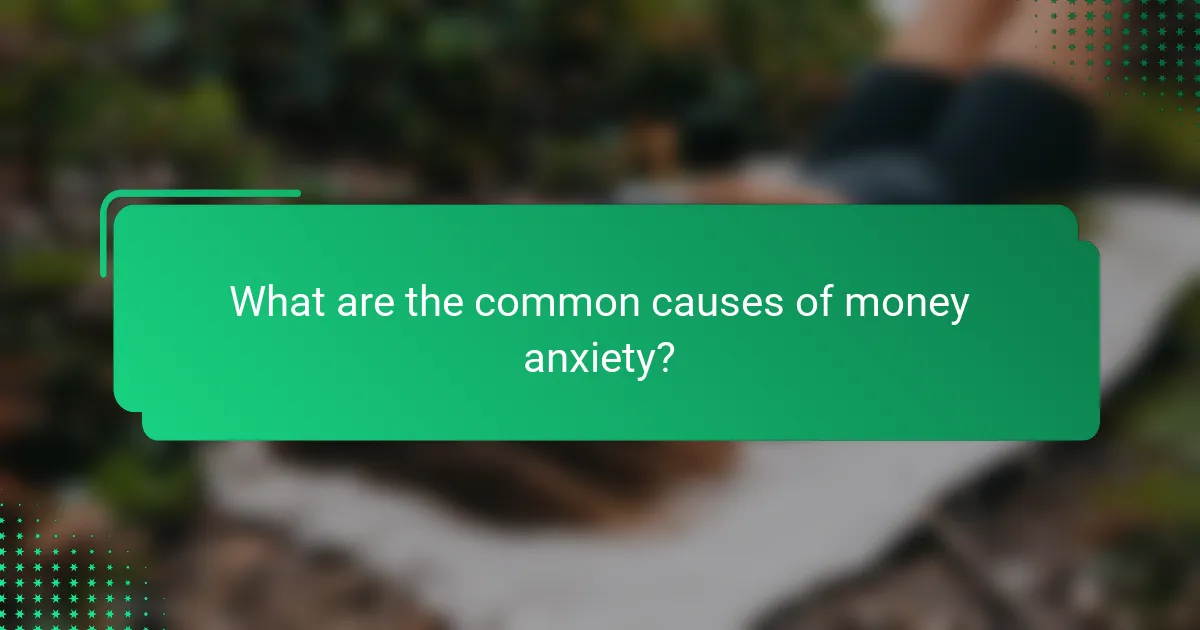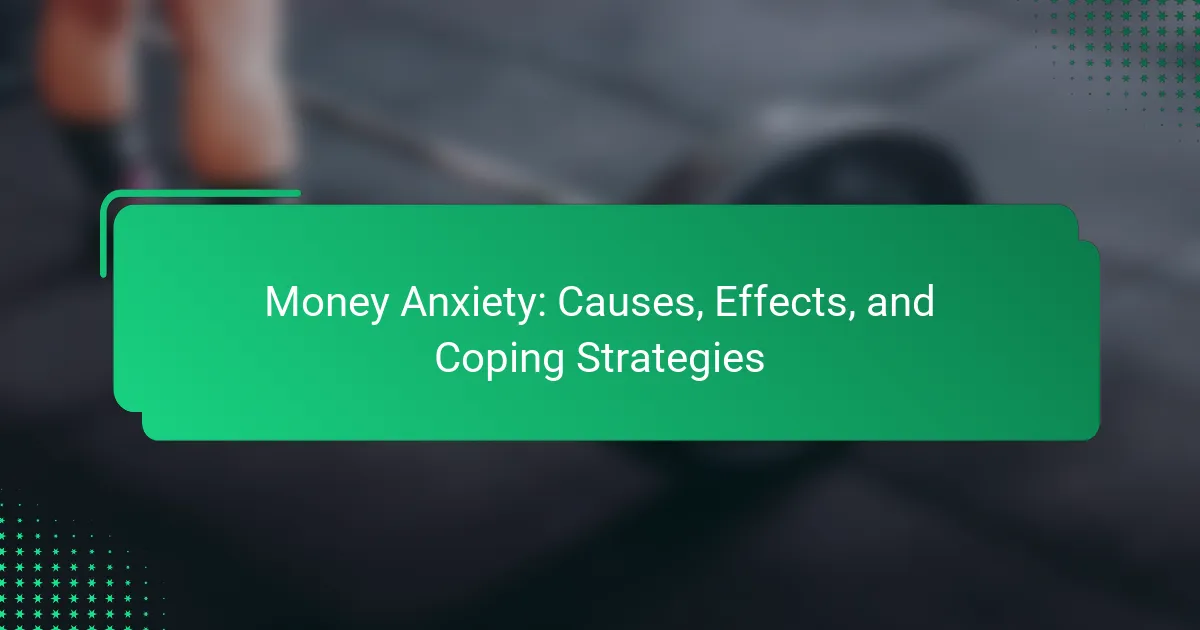Money anxiety can significantly impact your mental health and decision-making. It arises from various causes, including financial instability and societal pressures. The effects range from persistent worry to physical symptoms. Effective coping strategies involve budgeting, mindfulness, and seeking professional help to manage financial stress.

What is Money Anxiety?
Money anxiety is a psychological condition characterized by excessive worry about financial matters. It can stem from various causes, including economic instability, personal financial challenges, or societal pressures. The effects of money anxiety often manifest as stress, anxiety disorders, and impaired decision-making. Coping strategies include budgeting, financial education, and seeking professional advice to manage financial stress effectively.
How does money anxiety manifest in daily life?
Money anxiety manifests in daily life through stress, avoidance behaviours, and impaired decision-making. Individuals may experience constant worry about finances, leading to physical symptoms like insomnia or headaches. This anxiety can result in avoiding financial discussions, delaying bill payments, or making impulsive purchases to alleviate stress temporarily. Over time, these patterns can damage relationships and hinder overall well-being.
What are the psychological effects of money anxiety?
Money anxiety can lead to stress, depression, and impaired decision-making. Individuals experiencing this anxiety often face chronic worry about financial stability, affecting their mental health and relationships. Research indicates that financial stress can trigger physical symptoms, such as headaches and fatigue. Coping strategies include budgeting, seeking financial advice, and practicing mindfulness to alleviate anxiety.

What are the common causes of money anxiety?
Common causes of money anxiety include financial instability, job insecurity, debt levels, unexpected expenses, and societal pressures. These factors can create a persistent worry about financial well-being and future security. Financial instability often stems from inadequate income or loss of employment, while high debt levels can lead to feelings of helplessness. Unexpected expenses, such as medical emergencies, further exacerbate anxiety. Societal pressures, including comparisons with peers or societal expectations, can intensify feelings of inadequacy related to financial status.
How do personal financial situations contribute to money anxiety?
Personal financial situations significantly contribute to money anxiety by creating stress and uncertainty. Factors such as income instability, high debt levels, and inadequate savings amplify feelings of insecurity. For instance, individuals facing job loss or unexpected expenses may experience heightened anxiety about their financial future. Additionally, societal pressures and comparisons can exacerbate these feelings, leading to a cycle of worry and distress. Understanding these connections is crucial for developing effective coping strategies.
What role does societal pressure play in money anxiety?
Societal pressure significantly contributes to money anxiety by creating unrealistic expectations about financial success. Many individuals feel compelled to meet societal standards, leading to stress and feelings of inadequacy. This pressure is often exacerbated by social media, where curated lifestyles can distort perceptions of financial norms. As a result, people may engage in unhealthy financial behaviours, such as overspending, to keep up appearances. Understanding this dynamic is crucial for developing effective coping strategies to manage money anxiety.
How does economic instability affect money anxiety levels?
Economic instability significantly increases money anxiety levels. Factors such as job loss, inflation, and market fluctuations create uncertainty about financial security. As a result, individuals may experience heightened stress and worry about their financial future, impacting mental health and decision-making. Research indicates that during periods of economic downturn, anxiety related to money often escalates, leading to a cycle of fear and reduced spending, further exacerbating economic conditions.

What are the universal symptoms of money anxiety?
Common symptoms of money anxiety include persistent worry about finances, difficulty sleeping, changes in appetite, and increased irritability. These symptoms can lead to stress and impact overall well-being. Understanding these effects is crucial for developing coping strategies.
How does money anxiety impact mental health?
Money anxiety significantly impacts mental health by increasing stress and leading to conditions like depression. Financial worries can trigger anxiety disorders, affecting sleep, relationships, and overall well-being. A study found that 72% of Americans report feeling stressed about money, highlighting its pervasive influence on mental health. Coping strategies include budgeting, seeking financial advice, and practicing mindfulness, which can mitigate these effects.
What physical symptoms are associated with money anxiety?
Money anxiety can lead to various physical symptoms, including headaches, muscle tension, and gastrointestinal issues. These symptoms arise from stress and worry about financial situations. Frequent experiences of anxiety may result in fatigue, insomnia, and changes in appetite. Recognizing these symptoms is essential for addressing the underlying anxiety effectively.

What unique factors influence money anxiety in different demographics?
Various factors drive money anxiety across demographics, including income level, education, and cultural background. Lower-income individuals often experience heightened anxiety due to financial instability. Education influences financial literacy, affecting how individuals perceive and manage their finances. Cultural norms also shape attitudes toward money, impacting stress levels associated with financial situations. Additionally, unique attributes such as age and family responsibilities can amplify money anxiety, with younger individuals facing student debt and parents managing household expenses. Understanding these factors can aid in developing targeted coping strategies.
How do age and life stage affect money anxiety?
Age and life stage significantly influence money anxiety. Younger individuals often face anxiety due to student loans and job instability. In contrast, middle-aged adults may experience stress from family responsibilities and retirement planning. Older adults often worry about fixed incomes and healthcare costs. Each stage presents unique financial challenges, affecting emotional well-being.
What unique challenges do women face regarding money anxiety?
Women face unique challenges regarding money anxiety, including societal expectations and wage disparities. These factors contribute to heightened stress about financial stability. Research shows that women are more likely to experience financial insecurity due to lower average incomes and increased caregiving responsibilities. Additionally, women may face unique emotional responses to financial situations, often feeling guilt or shame about spending. Addressing these challenges requires targeted coping strategies, such as financial education and support networks.
How does cultural background shape perceptions of money anxiety?
Cultural background significantly influences how individuals perceive and experience money anxiety. Different cultures have distinct values around wealth, spending, and financial security, which shape attitudes toward money. For instance, collectivist cultures may prioritize community support over individual financial success, reducing personal money anxiety. Conversely, cultures that emphasize individual achievement may heighten anxiety related to financial performance. This variation in perspective can lead to different coping strategies, such as seeking communal resources or adopting a more competitive financial approach. Understanding these cultural nuances is crucial for addressing money anxiety effectively.

What are some rare manifestations of money anxiety?
Rare manifestations of money anxiety include extreme hoarding behaviours, obsessive budgeting rituals, and physical symptoms like panic attacks during financial discussions. These unique expressions often stem from deep-rooted fears related to financial instability and can significantly impact daily life. Individuals may experience avoidance of financial situations or develop irrational beliefs about money, leading to further anxiety. Understanding these rare manifestations can aid in developing targeted coping strategies.
How can extreme financial stress lead to anxiety disorders?
Extreme financial stress can significantly increase the risk of anxiety disorders. This stress often stems from overwhelming debt, job loss, or unexpected expenses, leading to persistent worry about financial stability. As a result, individuals may experience heightened anxiety symptoms, such as restlessness, irritability, and difficulty concentrating. Research indicates that financial stress correlates with increased rates of generalized anxiety disorder and panic attacks. Addressing these financial issues through budgeting, financial planning, and seeking professional help can mitigate anxiety and promote mental well-being.
What are the less common coping mechanisms for money anxiety?
Less common coping mechanisms for money anxiety include creative expression, mindfulness practices, community support, and financial education workshops. These strategies can help individuals manage their anxiety in unique ways. For example, creative expression through art or writing can provide emotional release. Mindfulness practices, such as meditation, can ground individuals in the present moment, reducing anxiety. Community support fosters shared experiences, while financial education workshops empower individuals with knowledge and skills to manage their finances effectively.

What coping strategies can help manage money anxiety?
To manage money anxiety, consider strategies like budgeting, mindfulness, and seeking professional help. These approaches address underlying concerns and promote financial stability.
Budgeting helps create a clear financial picture, reducing uncertainty. Mindfulness techniques can alleviate stress by focusing on the present, while professional counselling offers tailored support and coping mechanisms.
What practical steps can individuals take to alleviate money anxiety?
To alleviate money anxiety, individuals can adopt practical strategies. First, create a budget to track income and expenses, fostering control over finances. Second, build an emergency fund to provide a safety net, reducing stress during unexpected situations. Third, practice mindfulness techniques to manage anxiety levels, promoting a healthier mindset. Fourth, seek professional financial advice for tailored guidance, enhancing decision-making confidence. Lastly, engage in open discussions about money with trusted friends or family, normalising the topic and alleviating feelings of isolation.
How can financial education reduce money anxiety?
Financial education significantly reduces money anxiety by enhancing financial literacy. Understanding budgeting, saving, and investing equips individuals with the skills to manage their finances effectively. As a result, they experience increased confidence and reduced stress related to financial decisions. Studies show that individuals with financial education report lower anxiety levels and improved financial well-being. By addressing root causes of money anxiety, such as uncertainty and lack of knowledge, education empowers individuals to take control of their financial futures.
What resources are available for financial literacy?
Financial literacy resources include online courses, workshops, books, and community programs. These resources help individuals understand money management, budgeting, and investing. For example, the National Endowment for Financial Education offers free online courses. Additionally, local libraries often provide access to financial literacy workshops. Nonprofits like Junior Achievement also focus on educating youth about financial concepts. Access to these resources can significantly reduce money anxiety by enhancing knowledge and confidence in financial decision-making.
What role does therapy play in addressing money anxiety?
Therapy plays a crucial role in addressing money anxiety by providing coping strategies and emotional support. It helps individuals identify and understand the root causes of their anxiety, such as financial stress or fear of instability. Through cognitive-behavioural techniques, therapy can reshape negative thought patterns about money, fostering healthier financial habits. Additionally, therapy offers a safe space to explore feelings around money, promoting emotional resilience and reducing anxiety levels. This unique attribute of therapy enhances self-awareness, enabling individuals to manage their financial concerns more effectively.

What common mistakes should be avoided when dealing with money anxiety?
To manage money anxiety effectively, avoid these common mistakes: neglecting to create a budget, failing to track expenses, not seeking professional advice, allowing negative thoughts to dominate, and ignoring the emotional aspects of financial decisions. Each of these can exacerbate anxiety and hinder effective coping strategies.
How can avoidance behaviours exacerbate money anxiety?
Avoidance behaviours can significantly worsen money anxiety by creating a cycle of stress and financial neglect. Individuals may avoid budgeting or financial planning, leading to increased uncertainty about their finances. This lack of engagement can result in missed payments and mounting debt, further amplifying anxiety. As a result, the individual feels trapped in a negative feedback loop, where avoidance reinforces their fears and ultimately exacerbates their financial situation.
What misconceptions about money anxiety might hinder progress?
Misconceptions about money anxiety can significantly hinder progress by fostering avoidance behaviours. Many believe that anxiety indicates personal failure, leading to shame and inaction. Others think that financial literacy alone will resolve anxiety, neglecting emotional aspects. Additionally, the idea that discussing money is taboo can isolate individuals, preventing them from seeking support. Finally, some assume that overcoming anxiety is a quick fix, disregarding the need for ongoing coping strategies and self-awareness.

What expert insights can provide additional guidance on money anxiety?
Expert insights suggest that addressing money anxiety involves understanding its psychological roots and implementing practical coping strategies. Financial literacy plays a crucial role in reducing anxiety by empowering individuals with knowledge. Research indicates that maintaining a budget can alleviate stress related to financial uncertainty. Additionally, mindfulness practices, such as meditation, help manage anxiety by promoting emotional regulation. Seeking professional guidance from financial advisors or therapists can provide personalized strategies tailored to individual circumstances.
What are the latest trends in research on money anxiety?
Recent research on money anxiety highlights a growing awareness of its psychological impacts and coping mechanisms. Studies indicate that financial stress correlates with mental health issues, leading to increased anxiety levels. Innovative coping strategies, such as financial literacy programs, aim to mitigate these effects by empowering individuals with knowledge and skills. Additionally, digital tools for budgeting and expense tracking are gaining traction, providing users with real-time insights into their financial situations. This trend reflects a shift towards proactive management of money anxiety, emphasizing the importance of mental well-being in financial planning.
How can community support help in overcoming money anxiety?
Community support can significantly alleviate money anxiety by providing emotional reassurance and practical resources. Sharing experiences with others facing similar financial challenges fosters a sense of belonging and reduces isolation. Support groups often offer strategies for managing finances, which can empower individuals to take control of their financial situations. Additionally, community programs may provide access to financial education, counselling, and assistance, helping to build resilience against money-related stress. Engaging with a supportive network can transform anxiety into proactive coping mechanisms, enhancing overall financial well-being.
What are the best practices for long-term management of money anxiety?
To manage money anxiety long-term, establish a budget, track expenses, and set realistic financial goals. Develop a support system through discussions with trusted friends or professionals. Practice mindfulness techniques to reduce stress and improve financial decision-making. Regularly review and adjust your financial plans to adapt to changing circumstances.


